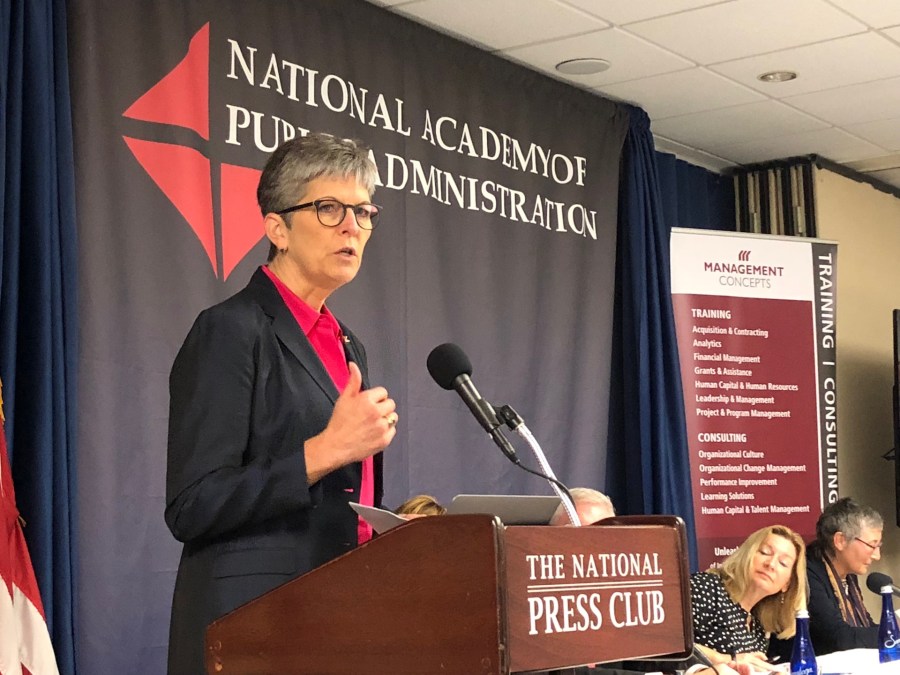Ditch the General Schedule, build competency-based workforce, report says

As the accelerating pace of technology upends how many Americans work, a new report suggests a complete overhaul of the federal workforce is needed to ensure the future role of government.
Officials from the National Academy of Public Administration detailed the second volume of its “No Time To Wait” report series Tuesday, advising that the federal government take steps to build a competency-based human capital structure and move away from the classification model of the General Schedule.
“If there is anything that is a universal truth in Washington, it’s a commitment to the fact that the civil service, as we know it, doesn’t work and it needs to be fixed,” said Don Kettl, academic director of the University of Texas at Austin’s LBJ Washington Center and chairman of the NAPA report’s panel.
Civil service reform has been an oft-discussed issue for decades, but the federal government’s increasing interest in artificial intelligence, machine learning and automation has made that reform more crucial, Kettl said. Agencies need a new workforce model that emphasizes performance and piloting new solutions.
The report calls for a series of administrative changes to reshape the workforce, including:
- More decentralization of hiring policies to promote human capital flexibility at the agency-level.
- More focus on mission-based achievement at the managerial level instead of regulation compliance.
- Creating a 90-day action task force of Chief Human Capital Officers and other to recommend immediate policy changes.
Research by McKinsey on the workforce in general has shown that while 9 percent of management activities could be automated, while up to two-thirds of the activities in data processing jobs can be automated.
“Jobs aren’t going to just go away,” said Bryan Hancock, a partner at McKinsey & Company specializing in workforce development. “It means work is going to be reconceived. It means that traditional job categories, in order to fully take advantage of automation and the [resulting] changes, it can’t be done with the current jobs because the jobs are going to be reorganized.”
Hancock added that while 51 percent, or $2.7 trillion, of U.S. wages could be potentially automated, only 1 percent of jobs would be completely eliminated by technology. As a result, meta-skills like growth mindsets and comfort with uncertainty — along with soft skills like creativity, critical thinking and communication — are going to be more valued while predictable physical skills in certain jobs will decline.
To meet those new solutions, the report calls for a mix of administrative changes and reforms of Title 5 of the U.S. Code to streamline how the federal government hires.
Some of that is already underway as part of the President’s Management Agenda. Angela Bailey, chief human capital officer for the Department of Homeland Security and a NAPA panel member, said DHS plans to roll out a new personnel system for cybersecurity jobs in 2019 as part of its PMA goals and it is currently examining how to navigate the policy changes needed to implement it.
“If you look at Title 5, you can drive a truck through it,” she said, noting that multiple flexibilities exist in the law. “We have lots of ideas, we have lots of areas in which we could actually go forward and readjust things administratively or through regulation and probably wouldn’t have to touch a whole lot of Title 5.”
Citing the challenges CHCOs currently face in assessing qualifications, Bailey said that if she tried to hire a skilled hacker out of high school to work on cybersecurity, the best she could provide in compensation is a GS-2 salary while the private sector could provide more incentives.
“One of the things we are doing is looking at this all-encompassing — like how you pay them appropriately to in a market-sensitive kind of environment,” she said. “How do you build in a system that winning a national hackathon is as good as having a master’s degree?”
But because the technologies forcing these changes are becoming more prevalent, Kettl stressed the importance of acting now to reform the civil service to meet them.
“There even less time to wait now. Because every day that we wait now makes it harder both to deliver government to citizens today that they deserve,” he said, “but even more importantly, to make sure that government has the capacity, in the future, to do that. If we don’t begin on the future immediately, when the future comes — which it already has — we’ll discover that we’ve fallen hopelessly behind.”






